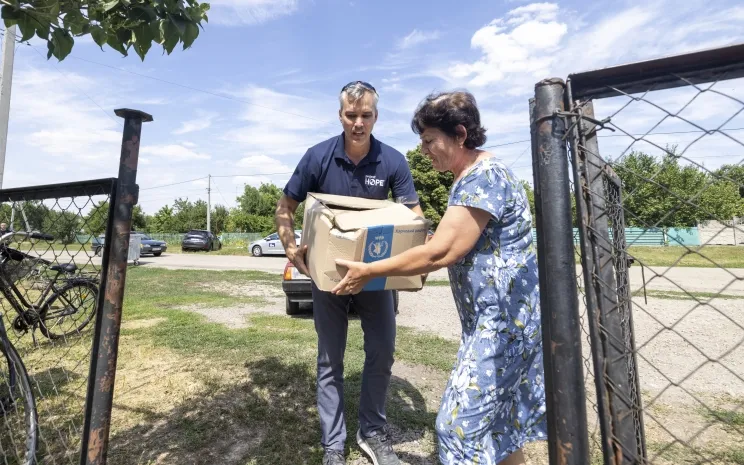
Project HOPE Teams Continue Supporting Ukrainians a Year into the Full-Scale Russian Invasion.
As we near the one-year anniversary since Russia’s full-scale invasion of Ukraine, Project HOPE – the global health and humanitarian aid organization – commemorates 12 months of devastation, impact, and hope.
Project HOPE has been working in Ukraine since the Russian invasion in late February of 2022, supporting health clinics with supplies and medicines, reconstructing medical facilities, training nurses and doctors on trauma and wound care, and providing mental health support to those impacted by the war.
Project HOPE is now operating seven offices across Ukraine – in Lviv, Kyiv, Kharkiv, Dnipro, Odesa, Kherson, and Kramatorsk – and has active refugee-focused programming in Poland, Moldova, and Romania.
“Since the immediate moments following Russia’s invasion, Project HOPE’s teams have worked around the clock in difficult and often dangerous conditions to deliver the urgent medical relief Ukrainians need,” said Project HOPE’s CEO & President, Rabih Torbay.
“The damage caused by Russia’s invasion has impacted every Ukrainian, young and old, across all walks of life. It has left a profound effect on the physical and mental health of an entire nation, especially children, and the people of Ukraine will continue to need our support for years to come.”
Last February, Project HOPE mobilized a rapid response to the humanitarian crisis and immediately deployed team members to provide health and humanitarian assistance across Ukraine, Poland, Moldova, and Romania. As air raid sirens rang out across Kyiv, Odessa, and Lviv, Project HOPE’s teams rushed medicines and medical supplies to hospitals in desperate need.
As women and children crossed international borders, they met them with mobile clinics and mental health support. And as courageous health care workers faced a surge in traumatic injuries, Project HOPE teams provided the medicines, equipment and training they needed to serve their communities.
As the war continued, Project HOPE launched mobile medical units, rehabilitated health facilities across the country, provided mental health support to displaced Ukrainians, opened safe spaces for refugee children, and provided wide-ranging assistance including hospital beds, wheelchairs, insulin pens, and vehicles.
With winter approaching, the teams also implemented winterization programming like delivering generators, repairing damaged facilities, and distributing badly needed items like thermal wear, mattresses, and blankets to hospitals, rural health clinics, and communities hosting large numbers of internally displaced people (IDPs).
How Project HOPE has responded in Ukraine to date:
-
Supported 317 health facilities in and around Ukraine
-
Partnered with 13 local organizations to respond
-
Rehabilitated 8 health and social facilities in Ukraine
-
Launched 11 mobile medical units in areas without health access to treat more than 28,000 patients
-
Provided mental health consultations to more than 24,787 people
-
Trained 2,712 Ukrainian health care workers in trauma care, mental health, and other skills
-
Delivered 86,500 insulin pens and 50,000 hygiene kits and non-food items
-
Delivered $8.7 million in medicine, medical supplies, and other relief
-
Donated 300 wheelchairs, 22 hospital-grade generators, and 5 vehicles to health facilities
-
Began reconstruction on 10 health and social facilities
Going forward, Project HOPE will continue to provide support to primary health facilities in conflict-affected oblasts of Ukraine and help re-establish essential services through surge staffing, the procurement of pharmaceuticals and medical commodities, and health care worker trainings.
Project HOPE will also be prepared to continue to deploy mobile medical units and will conduct water, sanitation, and hygiene (WASH) programming to ensure water systems are functioning and hospitals can implement infection prevention and control protocols.
The teams will continue to implement community-based health and hygiene promotion and psychosocial support services for IDPs, including counseling and referrals to protection services. In neighboring countries, Project HOPE’s work meeting the acute physical and mental health needs of Ukraine’s refugees continues to grow as long as the crisis endures.
“Project HOPE has responded to countless emergencies over the 65 years we’ve been operating, and we know that a crisis of this scale will require a concerted and long-term effort to not only rebuild the country, but to put the Ukrainian people on a pathway to recovery,” said Chris Skopec, Vice President of Global Health.
“365 days of full-scale war will leave scars that we cannot see in the form of mental health trauma and a health system that has been all but decimated, and Project HOPE is committed to standing alongside the people of Ukraine as we address their immediate- and long-term needs.”
Learn more about Project HOPE’s Ukraine response here. Access photos and videos with credits here.


Add new comment